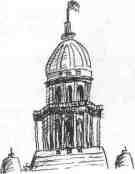Editor's choice
Culture and politics
FALLOUT FROM CENTRIFUGAL FORCES
THE DECLINE
OF REPRESENTATIVE
DEMOCRACY
Process, Participation,
and Power in
State Legislatures
Alan Rosenthal, 1998
Congressional Quarterly Press
THE ONE AND THE MANY
America's Struggle
for the Common Good
Martin E. Marty, 1997
Harvard University Press
In an election year, these two
seemingly disparate books make
surprising complementary reading.
Religion scholar Martin E. Marty
concerns himself with cultural
identity, political scientist Alan
Rosenthal with representative
democracy. Yet their underlying
purpose is the same: to assess the
dangers inherent in the fragmentation of our public enterprise.
Marty agrees with historian Gerda
Lerner that stories about a shared
past are vital because they help shape
a nation's or a community's identity.
Yet we live in an age when there are
many contending stories. "Are these
narratives," he asks, "all part of what
some have called a grand story, a
metanarrative? Or do citizens in their
various groups possess only separate
stories that isolate people from one
another?"
Believing the latter possibility
exists, Marty takes aim at so-called
identity politics. The American experiment, he warns, "is a delicate venture,
a gossamer fabric" that is threatened.
He contends that the nation's moral,
spiritual and intellectual capital are in
need of restoring, "but 're-storying the
body politic' says even more."
More may also be less at the extremes
of popular sovereignty. Alarmists
already envision a future not so distant
when each voter can determine policy
in the isolated glow of his or her
computer screen. Alan Rosenthal's
analysis of changes in the state assemblies turns on the distinction between
such super-democracy and the nature
of representation. He worries that
initiative powers and term limits are
already reducing cohesion and
authority in legislative bodies.
Neither book purports to be a how-
to manual, but both authors should be
saluted for red-flagging the potential
fallout from centrifugal forces in
our culture and our polity.
THE ONE AND THE MANY IN ILLINOIS: Excerpts from the Martin Marty Governor's Humanities Lecture
The Illinoisan is first and foremost a
heterogeneous character, and symbols fit
him with little grace....[;] his heterogeneity is in itself the final key to his
nature. Historically his State has been one
where paradox blossoms constantly, where
both Lincoln and the suppressors of Love-
joy were nurtured; where the Utopias of
the Janssonists and the Icarians rose in
counterpoint to the lusty individualism of
old Chicago.... Criss-crossed by railroads
from all corners of the country, a steelmaker, Illinois
in its entirety functions as a working
model of the Nation as a whole.
Who wrote those thoughtful words in
The WPA Guide to Illinois? ... The 1939
guide has been reprinted with a new
introduction, and there has been a freshly
conceived successor volume. But that little
excerpt from the original can be treated
canonically and classically to serve as an
epigraph for our effort to address questions
about Illinoisdom, Illinoishood, and the
like.
|
Exactly what occasioned and occasions
the claim that in Illinois paradoxes blossom
constantly, or at least sufficiently that to
mention it can help characterize the state?
The central one offered by
the WPA writer and many
before and after would go
something like this: There
are reasons to expect some
generalizations to apply in
any state, but particularism
abounds. One expects some
homogeneity in a state. But,
countering this, we get
remarkable heterogeneity in
"Illinois." ... In no state
would a demographer expect
complete uniformity. But
states may display some sort
of organic, bounded,
characteristics, especially because political
and cultural identities often merge and fuse
to some extent. Illinois, contrary to opinion
and expectation, then, manifests a distinctive kind of heterogeneity. All others flow
from that. |

Illustration by Mike Cramer
|
In an age when "identity
politics" is overdone, it seems
valid to point to multiple spheres
or intersections where loyalties
can be expressed, but without
fanaticism; where people find
enriched but not exclusive and
hence overlapping communities
that can contribute to their
identity without turning them
into tribalists.
Religion scholar Martin E. Marty is
retiring from the University of Chicago.
He delivered the fourth governor's
lecture last June, sponsored by the
Illinois Humanities Council.
Illinois Issues March 1998 / 31